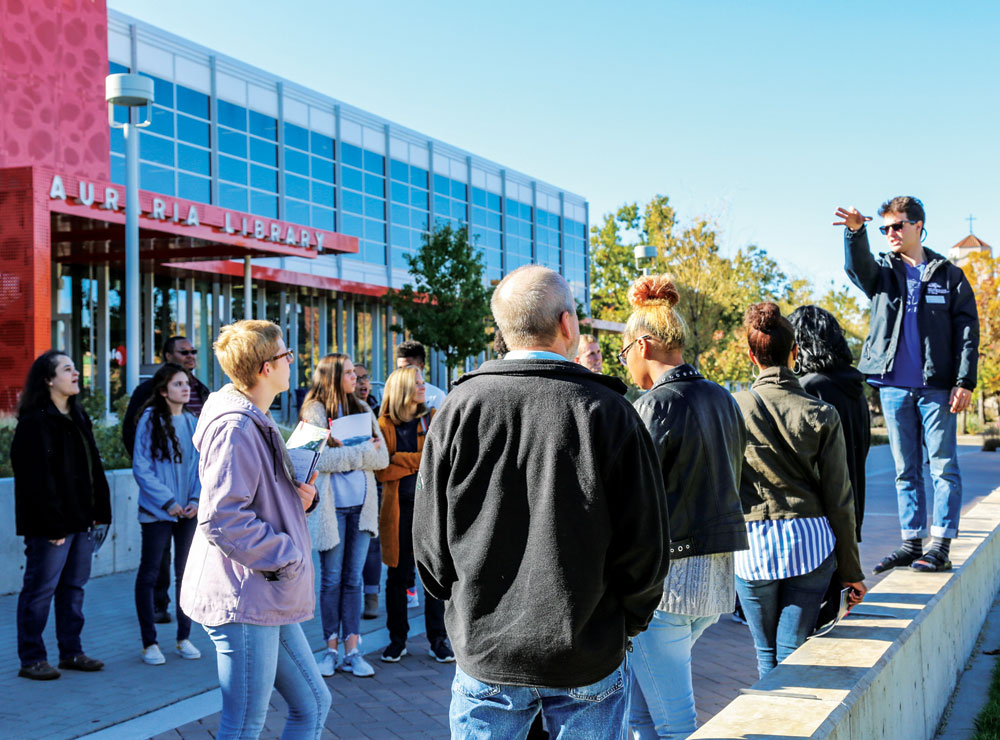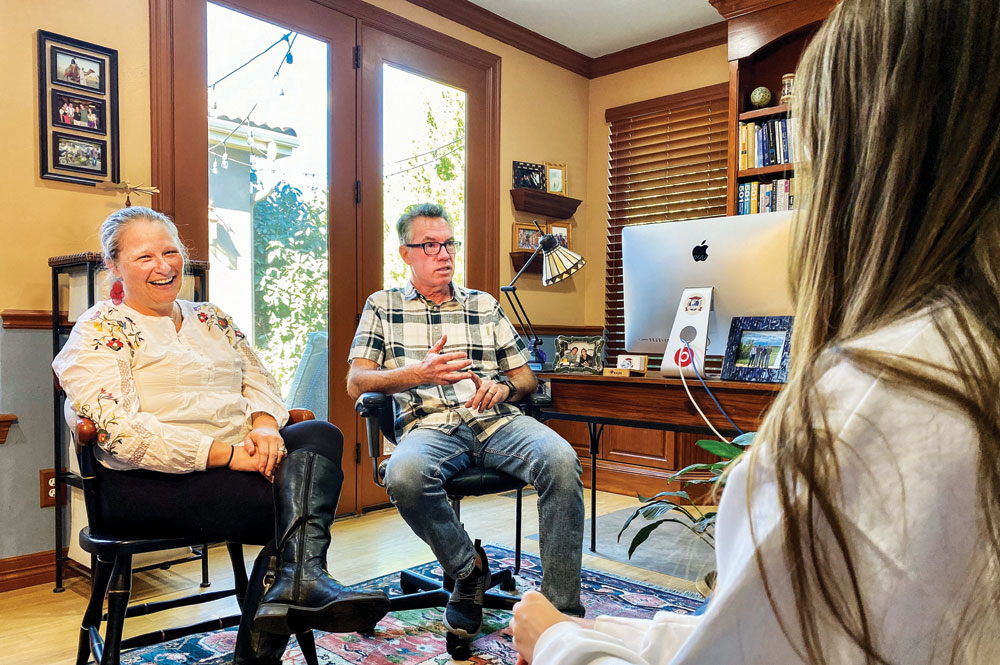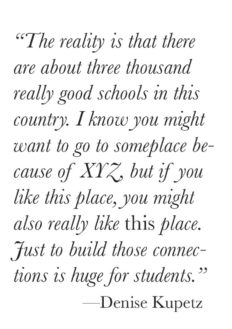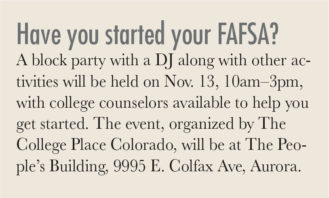
Tours like the one shown above at Metro State in Denver help students find the right fit in their college search. College planning counselor Jeff Ederer recommends also sitting down in the cafeteria and asking students to talk about their college experiences. Front Porch file photo by Steve Larson
I don’t remember applying to college, it was such a non-event in my family. My parents didn’t go to college, and I recall precisely one appointment with a guidance counselor. As deadlines loomed, I finally asked my older brother where to apply. He named four schools and without further research, I requested applications and applied to only those four, hammering out essays on a typewriter, the odor of White Out in the air.
If you recall the days of sweating over paper applications, the bell of your parents’ IBM Selectric as you reached the end of a line, and visiting a lonely guidance counselor whose office was located deep in the bowels of your high school, know that your child will have a very different experience. One click of a keyboard disseminates your student’s brilliant, insightful essays and copious list of activities to all the colleges and universities. Or at least that is the theory.
Applications and College Planning
Electronic submissions save students the stress of rushing to the post office, and the Common App streamlines applying. About 960 schools employ the Common App, some require the Coalition Application (about 150 schools), and a handful rely on the Universal Application. The names belie the fact that the applications are neither common nor universal. Many institutions still use their own applications and others add their own essay or short answer prompts to the Common App. The University of Chicago prides itself on its unpredictable, obscure questions such as “Where’s Waldo and why does it matter?” to challenge students.

“Higher education should be transformational, not transactional,” says college planning counselor Jeff Ederer. Ederer and Denise Kupetz “sherpa” students and families through the complex college application process. “Planning requires parents and students have hard conversations about finances. Financial aid portals opened October 1, and the sooner the better to submit these forms.” Front Porch photo by Christie Gosch
The process’s greater ease means students are also applying to more institutions, with 8-12 applications common according to Denise Kupetz, co-founder and half of the College Route Map team, a Central Park business centered on college planning. College planning services were not a concept when I submitted my applications, so Kupetz and co-founder Jeff Ederer share with me what it is they do exactly with their collective 55 years of higher education expertise. Ederer distills the mission into a single sentence: “We sherpa students and families through the process of college admissions.”
 Comprehensive planning includes helping students create a strong best-fit college list, a well-presented activity portfolio, set deadlines and goals, and edit and provide detailed feedback on multiple essays. The pair is committed to helping identify institutions that align with a student’s academic priorities, lifestyle and learning preferences (Urban? Rural? Small liberal arts? Large state school?), and economic realities.
Comprehensive planning includes helping students create a strong best-fit college list, a well-presented activity portfolio, set deadlines and goals, and edit and provide detailed feedback on multiple essays. The pair is committed to helping identify institutions that align with a student’s academic priorities, lifestyle and learning preferences (Urban? Rural? Small liberal arts? Large state school?), and economic realities.
“It’s not just a student going to college, but it’s the family getting their students to college, and not just getting there, but helping support them so that they are a successful college student and that they graduate. It’s a far more perilous process without parental buy-in,” says Ederer.
One student who started working with College Route Map in September admitted “I feel like I would be very behind if I didn’t have them helping me. I have a deadline this Friday for a school and I wouldn’t have been prepared if I hadn’t had help.” Ederer recommends students start the process in their junior year, taking advantage of existing travel plans to tour college campuses. On a budget? Tour nearby schools like the University of Colorado Boulder and Colorado College, to experience a large state versus a small private school. Beyond the formal tours, “sit in the cafeteria with a table full of students. Students love to tell people about their college experiences,” says Ederer.
Even before writing essays and meeting deadlines, developing a curated list of colleges is fundamental. “Ask students to name schools. Most will name 30. You could name maybe the Ivy League schools, the schools that are in your state, maybe a few others. But the reality is that there are about three thousand really good schools in this country. And so most of it is just trying to help a student learn about these, you know, three thousand that they don’t even know exists,” says Kupetz. “I know you might want to go to someplace because of XYZ, but if you like this place, you might also really like this place. Just to build those connections is huge for students.”
“Being open-minded is important, so if a school doesn’t perfectly fit what I want, that doesn’t mean it’s not a school that I wouldn’t succeed in, or enjoy. Like Boston University…I’m willing to sacrifice the weather because it has everything else that I want,” says the senior.
Ederer and Kupetz meet weekly with each student to help them to interrogate their priorities for their college experience, whittle down a list, engage parents, review essays, and keep students on track with deadlines.
Financial Aid
 The FAFSA and CSS portals opened October 1, and while most deadlines are not yet upon us, both federal aid programs (Pell Grants, student loans, work-study, etc.) and school-based aid rely on timely submission of documents. School-based aid, in particular, is time-sensitive, as it’s first-come, first-serve for scholarships and grants determined in large part by parents’ responses to the much more exhaustive (and exhausting) CSS Profile some colleges require.
The FAFSA and CSS portals opened October 1, and while most deadlines are not yet upon us, both federal aid programs (Pell Grants, student loans, work-study, etc.) and school-based aid rely on timely submission of documents. School-based aid, in particular, is time-sensitive, as it’s first-come, first-serve for scholarships and grants determined in large part by parents’ responses to the much more exhaustive (and exhausting) CSS Profile some colleges require.
Kupetz advises parents to “Be in it for the long haul. This is not a short process. It can be cumbersome, and depending on the financial situation, you may have to call the financial aid office. Hopefully, they’ll call you back. But there are real people that work there and they will usually help you through the process but it is annoyingly time consuming, especially if it’s not in our time zone.”
For more information about College Route Map visit https://www.collegeroutemap.com/ or call 720-422-7676.




0 Comments